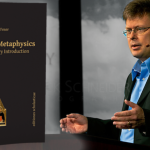The Road from Atheism: Dr. Edward Feser’s Conversion (Part 3 of 3)
by Dr. Edward Feser
Filed under Atheism, Conversion
NOTE: On Monday we shared Part 1 of Dr. Edward Feser's conversion story from atheism to theism and on Wednesday we posted Part 2. Today we share the final Part 3.
We'd also like to note that Dr. Feser's contributions at Strange Notions were originally posted on his own blog, and therefore lose some of their context when reprinted here. Dr. Feser explains why that matters.
Several crucial background elements were in place by the late 90s. Fregean and related arguments had gotten me to take very seriously the idea that something like Platonic realism might be true. (I would later see that Aristotelian realism was in fact the right way to go, but the basic anti-naturalistic move had been made.) The arguments of Searle and others had shown that existing versions of materialism were no good. Russellian arguments had shown that modern science and philosophy had no clear idea of what matter was in the first place. Whatever it was supposed to be, though, it seemed it was not something to which one could assimilate mind, at least not if one wanted to avoid panpsychism. Naturalism came to seem mysterious at best. Meanwhile, Aristotelian ideas had a certain plausibility. All that was needed was some systematic alternative to naturalism.
Then, in the late 90s, while still a grad student, I was given an opportunity to teach a philosophy of religion course, followed by several opportunities to teach “intro to philosophy” courses. In the latter, I wanted to focus on topics that would be of interest to undergrads who might have no general interest in philosophy. Since everyone had some interest in religion (even if only, in some cases, a hostile interest), arguments for God’s existence seemed a good topic for at least part of the course. Naturally, that was a topic for the philosophy of religion course too. So, I had a reason to revisit the subject after having given it relatively little thought for many years.
At first I taught the material the way so many professors do: Here are the arguments; here are the obvious fallacies they commit; let’s move on. I never came across like Richard Dawkins, but I no doubt did come across like Nigel Warburton (say): politely dismissive. And, as I gradually came to see, totally ill-informed. The “line ‘em up, then shoot ‘em down” approach was boring, and the arguments seemed obviously stupid. Yet the people who had presented them historically were obviously not stupid. So, it seemed to me that it would be interesting to try to give the arguments a run for their money, and to try to make it understandable to the students why anyone would ever have accepted them.
So I started to read and think more about them. I came to find William Rowe’s approach to the Leibnizian sort of cosmological argument interesting and pedagogically useful. He didn’t seem to accept the argument, but he made it clear that asking “What caused God?”, “How do we know the universe had a beginning?”, etc. weren’t really serious objections. He also made it clear that the thrust of the argument had to do with what was a straightforward and undeniably serious philosophical question: Should we regard the world as ultimately explicable or not? If not, then the argument fails. But if so, then it does seem to make it plausible that something like God, or at least the God of the philosophers, must exist. And it didn’t seem silly to wonder whether there might be such an explanation. Richard Taylor’s clear, punchy chapter on natural theology in his little book Metaphysics made the same point, and made for a useful selection for the students to read.
Naturally, I had already long been aware of this sort of argument. The difference was that when I had first thought about it years before I was approaching it as someone who had had a religious background and wanted to see whether there was any argument for God’s existence that was really persuasive. Russell’s retort to Copleston, to the effect that we can always insist that the universe is just there and that’s that, had then seemed to me sufficient to show that the argument was simply not compelling. We’re just not rationally forced to accept it. I had, as it were, put the argument on trial and it had been unable to establish its innocence to my satisfaction. But now I was approaching it as a naturalist who was trying to give my students a reason to see the argument as something at least worth thinking about for a class period or two. I was playing defense attorney rather than prosecution, but a defense attorney with the confidence of someone who didn’t have a stake in his client’s acquittal. Already being a confirmed naturalist, I could be dispassionate rather than argumentative, and could treat the whole thing as a philosophical exercise.
And from that point of view it started to seem that Russell’s reply, while it had rhetorical power, was perhaps not quite airtight philosophically. Sure, you could always say that there’s no ultimate explanation. And maybe there’s no way to prove otherwise. But is it really true? Is it really even more plausible to think that than to think that there is an explanation? Guys like Rowe and Taylor, by no means religious fanatics or apologists but just philosophers entertaining a deep question, seemed to take the question pretty seriously. Interesting, I thought. Though for the time being, “interesting” -- rather than correct or persuasive -- was all I found it.
Then there was Aquinas. At the high tide of my undergrad Brash Young Atheist stage, I had taken a class on medieval philosophy with the late John Cronquist, an atheist professor at Cal State Fullerton who was absolutely contemptuous of Christianity. Campus apologists of the Protestant stripe were a frequent target of his ire, though he had a choice quip or two about Catholicism as well. He was one of the smartest and most well-read people I have ever known -- the kind of guy you find intellectually intimidating and hope not to get in an argument with -- and I liked him very much. One of the odd and interesting things about that course, though, was how respectfully Cronquist treated some of the medievals, especially Aquinas. He said that compared to them, contemporary pop apologists were “like a pimple on the ass of an athlete.” (I remember him dramatically pointing to his own posterior as he said this, for emphasis.) He obviously didn’t buy the Scholastic system for a moment, but he treated the material as worth taking a semester to try to understand. And he said a couple of things that stood out. First, for reasons I don’t recall him elaborating on much, he seemed to think that the Third Way in particular might have something to be said for it. Second, he said that the mind-body problem, which he seemed to think was terribly vexing, really boiled down to the problem of universals. For years I would wonder what he meant by that. (I now think it must have had to do with the way our grasp of abstract concepts features in Aristotelian arguments for the immateriality of the intellect.)
At the time I filed these remarks away as curiosities (just as I had then regarded the material we covered in the class as mere curiosities). But I think his example made it easier for me, years later, to take a second look at Aquinas as I prepared course material. I look back at my first lectures on the Five Ways with extreme embarrassment. If you’d heard them, you’d have thought I was cribbing from an advance copy of The God Delusion, if not in tone then at least in the substance of my criticisms. But that started slowly to change as I read more about the arguments and began to work the material into my lectures. A good friend of mine, who had also gone from Catholicism to atheism and was a fellow grad student, was familiar with William Lane Craig’s book The Cosmological Argument from Plato to Leibniz, and seemed to find it useful in preparing his own lectures on the subject. Our discussions of the arguments were very helpful. Furthermore, Atheism and Theism by J. J. C. Smart and John Haldane had recently appeared, with Haldane defending, and Smart treating respectfully, some old-fashioned Thomistic arguments for the existence of God. Such materials opened up a new world. The way I and so many other philosophers tended to read the Five Ways was, as I gradually came to realize, laughably off base.
The immediate effect was that I found a way to teach the Five Ways without seeming like I was putting fish in a barrel for the students to shoot at. I still didn’t agree with the arguments, but at least teaching them was getting interesting. I recall one class period when, having done my best to try to defend some argument (the First Way, I think) against various objections, I finally stated whatever it was I thought at the time was a difficulty that hadn’t been satisfactorily answered. One of my smartest students expressed relief: She had been worried for a moment that there might be a good argument for God’s existence after all! (Anyone who thinks wishful thinking is all on the side of religious people is fooling himself.)
None of this undermined my commitment to naturalism for some time. I published my first several journal articles while still in grad school, and two of them were criticisms of the doctrine of the Trinity. (I’m now a staunch Trinitarian, of course. But once again, it turns out that I still more or less agree with the arguments I then presented. The versions of Trinitarianism I then attacked are, I continue to think, wrong. But Trinitarianism itself is true.)
But the language of act and potency, per se and per accidens causal series and the like started to enter my lectures on Aquinas, and before long, my thinking. It was all very strange. Aquinas’s arguments had a certain power when all of this metaphysical background was taken account of. And there was a certain plausibility to the metaphysics. There were reasons for distinguishing between actuality and potentiality, the different kinds of causal series, and so forth. Yet no one seemed to talk that way anymore -- or, again, at least no one “mainstream.” Could there really be anything to it all if contemporary philosophers weren’t saying anything about it? And yet, precisely because they weren’t talking about it, they weren’t refuting it either. Indeed, when they did say anything about Aquinas’s arguments at all, most of them showed only that they couldn’t even be bothered to get him right, much less show why he was mistaken. Arguments from current philosophical fashion are bad enough. But when most philosophers not only do not accept a certain view, but demonstrate that they don’t even understand what it is, things can start to smell very fishy indeed.
And so they did. I already knew from the lay of the land in the philosophy of language and philosophy of mind that the standard naturalist approaches had no solid intellectual foundation, and themselves rested as much on fashion as on anything else. Even writers like Searle, who I admired greatly and whose naturalism I shared, had no plausible positive alternative. McGinn-style mysterianism started to seem like a dodge, especially given that certain arguments (like the Platonic realist ones) seemed to show that matter simply is not in fact all that there is, not merely that we can’t know how it can be all that there is. Some secular writers were even toying with Aristotelian ideas anyway. The only reason for not taking Aquinas and similar thinkers seriously seemed to be that most other academic philosophers weren’t taking them seriously. And yet as I had come to learn, many of them didn’t even understand Aquinas and Co. in the first place, and their own naturalism was riddled with problems. Against Aquinas, for naturalism -- the case increasingly seemed to come down to the consensus of the profession. And what exactly was that worth?
It isn’t worth a darn thing, of course. Careerists might not see that, nor might a young man more excited by the “question what your parents taught you” side of philosophy than all that “objective pursuit of truth” stuff. But a grownup will see it, and a philosopher ought to see it.
I don’t know exactly when everything clicked. There was no single event, but a gradual transformation. As I taught and thought about the arguments for God’s existence, and in particular the cosmological argument, I went from thinking “These arguments are no good” to thinking “These arguments are a little better than they are given credit for” and then to “These arguments are actually kind of interesting.” Eventually it hit me: “Oh my goodness, these arguments are right after all!” By the summer of 2001 I would find myself trying to argue my wife’s skeptical physicist brother-in-law into philosophical theism on the train the four of us were taking through eastern Europe.
There’s more to the story than that, of course. In particular, it would take an essay of its own to explain why I returned to the Catholic Church, specifically, as I would by the end of 2001. But I can already hear some readers protesting at what I have said. I don’t mean the New Atheist types. No, I’m talking about a certain kind of religious believer, the type who’s always going on about how faith is really a matter of the heart rather than the head, that no one’s ever been argued into religion, etc. It will be said by such a believer that my change of view was too rationalistic, too cerebral, too bloodless, too focused on a theoretical knowledge of the God of the philosophers rather than a personal response to the God of Abraham, Isaac, and Jacob.
But the dichotomy is a false one, and the implied conception of the relationship between faith and reason not only foolish but heterodox. As to the heterodoxy and foolishness of fideism, and the correct understanding of the relationship of faith and reason, I have addressed that set of issues in a previous post on my personal blog. As to the “heart versus head” stuff, it seems to me to rest on an erroneous bifurcation of human nature. Man is a unity, his rationality and animality, intellect and passions, theoretical and moral lives all ultimately oriented toward the same end. That is why even a pagan like Aristotle knew that our happiness lay in “the contemplation and service of God,” whose existence he knew of via philosophical argumentation. That is why Plotinus could know that we “forget the father, God” because of “self-will.” While the pagan may have no access to the supernatural end that only grace makes possible, he is still capable of a natural knowledge of God, and will naturally tend to love what he knows.
As Plotinus’s remark indicates, that does not mean that the will does not have a role to play. But that is true wherever reason leads us to a conclusion we might not like, not merely in matters of religion. And once you have allowed yourself to see the truth that reason leads you to, what reason apprehends is (given the convertibility of the transcendentals) as good and beautiful as it is real. If you find yourself intellectually convinced that there is a divine Uncaused Cause who sustains the world and you in being at every instant, and don’t find this conclusion extremely strange and moving, something that leads you to a kind of reverence, then I daresay you haven’t understood it. Of course, there are those whose heads and hearts are so out of sync that they cannot follow both at the same time. But we shouldn’t mistake this pathology for an insight into human nature.
Speaking for myself, anyway, I can say this much. When I was an undergrad I came across the saying that learning a little philosophy leads you away from God, but learning a lot of philosophy leads you back. As a young man who had learned a little philosophy, I scoffed. But in later years and at least in my own case, I would come to see that it’s true.
Related Posts
Note: Our goal is to cultivate serious and respectful dialogue. While it's OK to disagree—even encouraged!—any snarky, offensive, or off-topic comments will be deleted. Before commenting please read the Commenting Rules and Tips. If you're having trouble commenting, read the Commenting Instructions.













